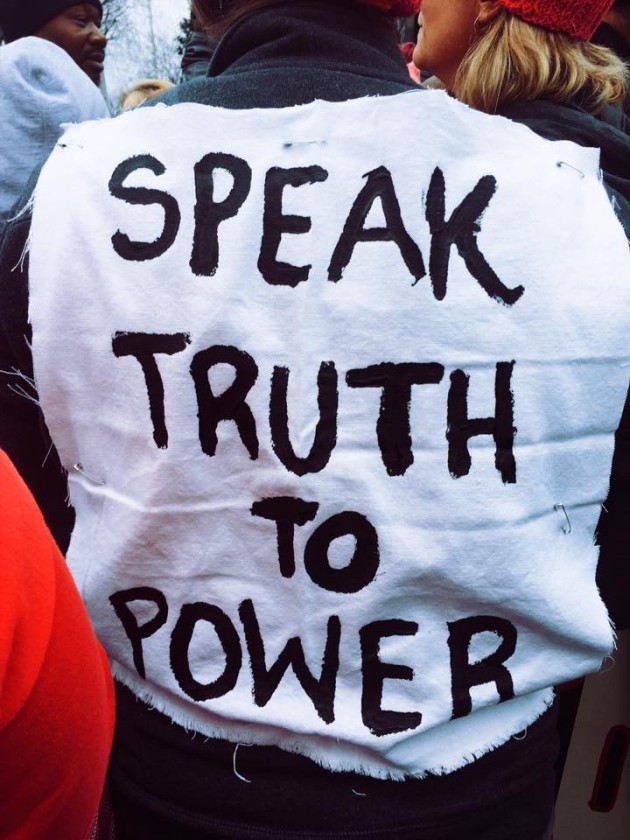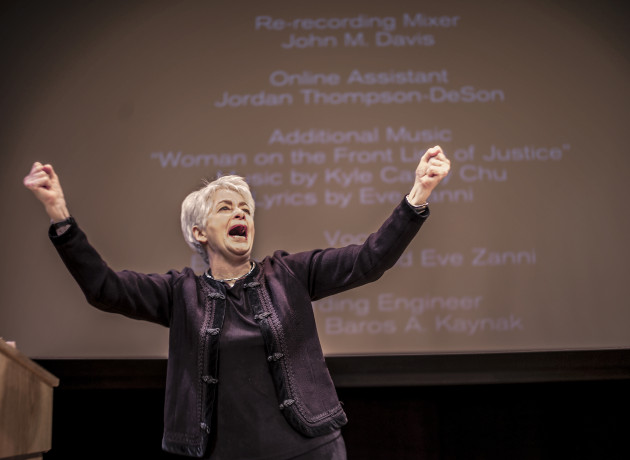
by Amy Stone
Film: ‘Heather Booth: Changing the World’ Don’t Despair. Organize!

Photo credit: Shira Gorelick, taken at the Women’s March in Washington, D.C.
Filmmaker Lilly Rivlin hit it right on this one.
“Heather Booth: Changing the World”—the final film in Rivlin’s trilogy of activist Jewish women (Grace Paley, Esther Broner) premiered in New York at the Manhattan JCC just before the Trump inauguration. The documentary of a woman whose lifelong work has been organizing for progressive change ends with the date November 9, 2016 (11/9 – the eerie reversal of 9/11) filling the screen, the date of Trump’s electoral college victory. Then Trump’s face fills the screen, and we hear Booth’s voice: “We will organize. We will stand up.”
The three-year project was a collaboration between filmmaker Rivlin (hard to believe she’s now 80) and Booth, now 71. Booth insisted that the film be a tool for organizing. And it is.
Like many nice Jewish girls, after high school, she spent a summer in Israel – working on a kibbutz and visiting Jerusalem’s Yad Vashem. The Holocaust Museum sparked her passion for social justice as an intrinsic Jewish value. What’s unique is her skill in working for social justice through organizing, not limiting her strategies to one cause or one organization.
Booth started organizing in the civil rights movement, then the anti-Vietnam War movement and the women’s movement. As an idealistic 18-year-old who’d just finished her freshman year at the University of Chicago, she went south to Mississippi for Freedom Summer. We see a sweet black and white photo of young Heather, guitar in hand, with civil rights legend Fannie Lou Hamer. The movement bringing white students south to work with local black organizers on voter registration seared the nation when three young people—two white and one black—Schwerner, Goodman and Chaney—were brutally murdered. Booth never turned back.
The next year, back in college, she helped a Chicago woman get an abortion when abortions were illegal. Word spread and demand grew. Extremely risky business, Booth started what became JANE Underground, a collective which helped more than 10,000 women get safe abortions. A few years later she was part of the founding of the Chicago Women’s Liberation Union.
When she and her husband – two activists raising young children – needed childcare, she organized the Action Committee for Decent Childcare, calling on Chicago for quality childcare paid for by the city. When the city kept its childcare study secret, by a stroke of luck and nerve the ACDC was able to lay hands on the study and get funded childcare.
Booth has never stopped taking on the challenges defining the progressive issues of this American half-century. And she is the perfect person to tell her story – silver haired, articulate, classy.
Rivlin’s major interview with Booth is the backbone of the film, interwoven with home movies, archival footage and interviews with those who worked with Booth or were trained by her at Midwest Academy, the Chicago school she co-founded to teach the skills of organizing for social change.

Heather Booth following film premiere: “Are you ready to organize?” Photo credit: Joan Roth
A skilled tactician, Booth founded multiple organizations in the ’70s. By the ’80s, she was working on mainstream political campaigns, heeding the words of African-American educator and politician Alice Palmer: “If you don’t do politics, politics does you.”
In 2000, Booth headed the NAACP’s National Voter Fund, registering nearly two million African-Americans.
Senator Elizabeth Warren gives Booth the highest praise. When Warren asked how to get support for creating the Consumer Financial Protection Bureau against a million-dollars-a-day lobbying opposition, she was told: You’ve really got to get organized. When she said, “Great. How?” she was told: “I’ve got two words for you – Heather Booth.”
Rivlin’s film gives us hints of what a wide-ranging and intrinsically organized person Booth is. By their refrigerators you shall know them. And Booth’s is completely covered with a mosaic of tiny items, all impeccably lined up top to bottom, side to side. Same for her desk – a huge number of folders sits at the back of the desk, all neatly lined up.
And we get to hear from her husband, Paul Booth. Married for 50 years this year, they met when she was working with the Student Nonviolent Coordinating Committee and he was with Students for a Democratic Society, which he helped found. The way Paul tells it, after one week, he proposed marriage and moved in. Heather’s former boyfriends had to move out the back door. He went on to a career of labor organizing with the American Federation of State, County and Municipal Employees (AFSCME), where he’s now executive assistant to the president.
What we don’t see in the film is any conflict, personal struggle, an ability to bring strongly held opposing viewpoints together. Is this in the curriculum of Midwest Academy?
We also don’t get to see what a charismatic speaker Booth is.
When the film premiere ended and Booth took the microphone, her opening words to the packed auditorium were, “Are you ready to organize?”
“Yes!” A resounding “Yes!”
Based on its debut, “Heather Booth: Changing the World” is truly an effective call to action, just when we need it.
Rivlin plans to get the film shown widely, starting with film festivals then going into distribution. “Heather Booth: Changing the World” will be available from Women Make Movies, http://www.wmm.com/.
Meanwhile…paralyzed or depressed by the Trump presidency? See the trailer—http://heatherbooththefilm.com/trailer.html
Amy Stone is a founding mother of Lilith, now a contributing editor and an ongoing Lilith blogger.
The views and opinions expressed in this article are the author’s own and do not necessarily reflect those of Lilith Magazine.